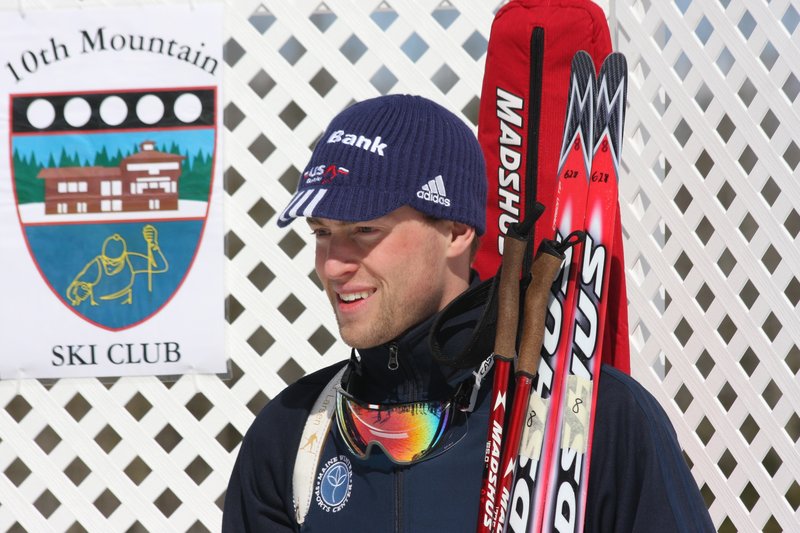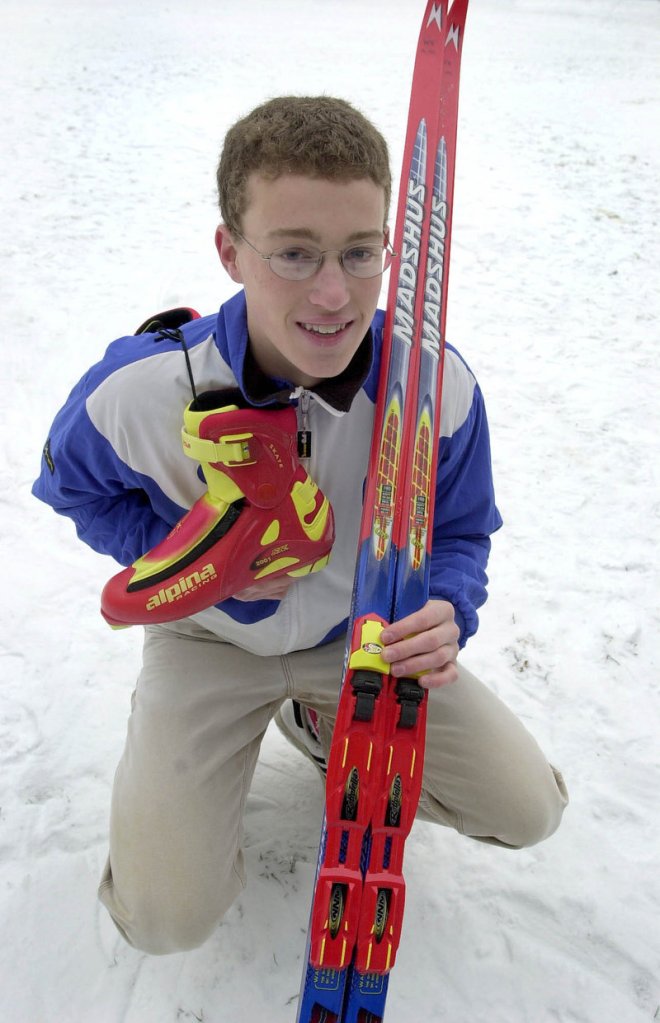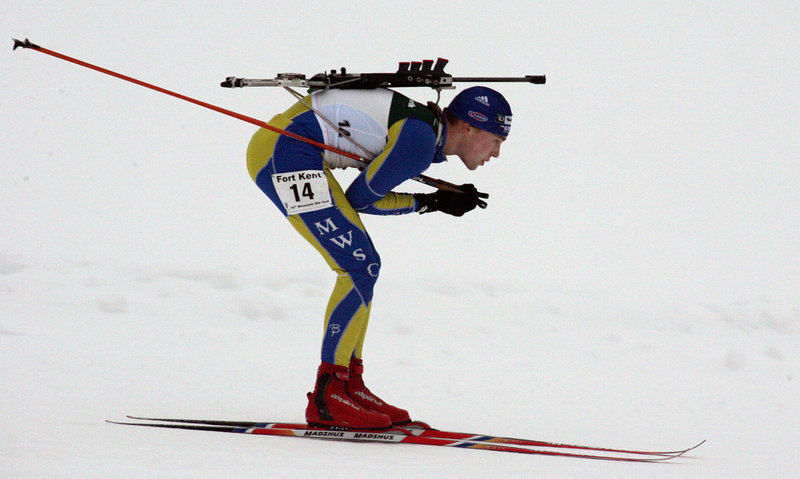The logo for the Maine Winter Sports Center is spare and elegant, inspired by the design on a hand-crafted pair of century-old wooden skis displayed in the New Sweden Historical Society.
Called a snow rose, the single-stemmed flower with three petals carved into each tip was a way for the daughter of one Walter Norbeck – born in Woodland in 1895 – to easily distinguish her skis from those of her schoolmates.
As for the face of the Maine Winter Sports Center, the non-profit entity charged with re-establishing skiing as a lifestyle while creating economic opportunities in the state’s rural communities, that belongs to another Walt.
Walt Shepard.
Shepard is the kid from Yarmouth who discovered biathlon at an age – 9 – when anything seemed possible. He devoted much of the next 18 years to this sport pairing rifle marksmanship with cross country skiing. He traveled to Vermont for training at what was then the only biathlon facility in New England, moved to Sweden his junior year of high school, deferred college several times and eventually reached the highest levels of international competition.
“He definitely left his mark on this program,” said Gary Colliander, director of biathlon for MWSC.
True, Shepard twice fell shy of fulfilling a dream of making the U.S. Olympic team, but said the journey was worth the effort.
“It has been a lot of fun,” Shepard said from Aroostook County, where today he will take part in the final event of the SuperTour Finals, a freestyle cross-country skiing hill climb in Fort Kent involving the Lonesome Pines Alpine area as well as the 10th Mountain Center Nordic trails.
“I’ve done everything in my career that I’ve wanted to, except go to the Olympics,” he said. “This sport has really changed my entire world view and shaped me as a person. I feel like the sport of biathlon found me at a time where I was just completely willing and able to explore it, to the point where it was something I just knew I wanted to do, and see as far as it could take me.”
Shepard’s passport contains stamps from 17 countries. He speaks two foreign languages, Swedish and German. Last weekend, at the age of 27, he put away his biathlon rifle for the last time after winning three silver medals at the national championships in Fort Kent.
That brought his medal haul at national and international competitions to 32. They include five junior national titles, four senior national titles and three North American titles. He was a member of three world championship teams as a junior and one world championship team, in 2005, as a senior.
He was the first Maine Winter Sports Center athlete, and remains the most decorated MWSC athlete.
“In so many ways he became the ambassador for the Maine Winter Sports Center around the country,” said Max Cobb, executive director of U.S. Biathlon, whose Pineland Farms headquarters are the only Olympic organization with physical roots in Maine. “He’s such a terrific athlete, a great student, articulate, handsome and outgoing, and he can be quite a motivational speaker. All of those things were on display every time he spoke to someone about the sport.”
Shepard spoke about the sport a lot. In addition to enlightening audiences of newspaper, radio and television, he also founded a nonprofit organization called Healthy Aim targeted at Maine schoolchildren a few years older than he was when, during a family ski vacation in Quebec, he became captivated by the 1992 Albertville Olympic biathletes he saw on Canadian television.
From 2003 to 2006, Shepard visited hundreds of Maine schools and spoke with thousands of schoolchildren about healthy lifestyle choices, about biathlon, about chasing a dream. He’d visit a school once in the fall and return in the spring.
“It’s all about not only delivering a message but providing a continuous opportunity to engage in that message,” Shepard said.
“That’s really the best model for any organization that wants to have an impact on the health of kids.”
The Maine Winter Sports Center came about in large part because Shepard’s infatuation with biathlon dovetailed with the sport’s national body seeking more venues with reliable conditions.
March in Lake Placid is an iffy proposition. Walt’s father, Andy Shepard, worked for L.L. Bean, which became a sponsor of the U.S. team. He had been the cross-country ski coach at Bowdoin College.
“In a lot of ways, Walt’s interest in biathlon provided the impetus for the whole Maine Winter Sports Center,” said Cobb, who has been with U.S. Biathlon for more than two decades. “As we were talking about how Walt can train – he had to drive to Jericho, Vt., four hours away – that sparked a discussion of, ‘What would it look like if we had biathlon in Maine?’ That led to a discussion of northern Maine and the abundance of snow they have up there.”
Andy Shepard came up with a plan, made possible by the backing of the Libra Foundation, that resulted in world-class biathlon facilities in Fort Kent and Presque Isle. (Seeing their success, Madawaska has built its own trail system, and hosted much of the SuperTour finals last week.)
Shepard eventually left Bean to become CEO of the MWSC, which means Walt has always been the boss’ kid. That meant if you wanted respect, working harder than anyone else and proving your ability – not your connections – got you where you are. Not that family connections can help you nail a target the size of a silver dollar from 50 meters in a swirling snow squall while your heart is hammering, but still.
“I’m sure at some level that had to be a little bit hard on him,” Cobb said of Walt, “but Andy was always a force for positive change, he always advocated for the other athletes more than he advocated for Walt. People like him for who he is. People loved having Walt on the team because he’s a ton of fun and a hard worker. He was always really strong on the shooting range, too. That was always an inspiration.”
Retiring from competition doesn’t mean Walt is giving up the sport entirely. He plans to volunteer with the growing Southern Maine Biathlon Club, which recently sent three dozen members to the national competition in Fort Kent. He plans on returning to Bowdoin in the fall to complete his senior year and earn his degree. Beyond that, the field of renewable energy seems interesting.
“I feel that has a strong future in global society and also that the opportunities here in Maine will be great,” he said. “Having spent my youth traveling around the world, I think I’ve been able to learn at a relatively young age that Maine is where I want to be long-term.”
The winner of last Sunday’s swan song, a 15-kilometer mass start? Russell Currier of Stockholm, who inherits the torch from Shepard as Maine’s pre-eminent biathlete.
“That was pretty cool,” Shepard said. “He’s really struggled this year and I know what it’s like to have a bad season. For him to have that race on the last race of the season I hope will go a long way for him to help erase the bad feelings for this year and have some motivation for next year, and have a sweeter taste on his palate than he otherwise would have this summer and fall.”
Articulate to the end, optimistic for the future, Shepard skied off into the sunset. In Maine, the biathlon genie is out of the bottle, and Walt is the kid who uncorked it.
“I realize it’s a lot bigger than just me,” he said, “but to have been a part of all that, I can’t even express what it means to me. It’s really special, something that I’ll always cherish.”
Staff Writer Glenn Jordan can be contacted at 791-6425 or at:
gjordan@pressherald.com
Send questions/comments to the editors.






Success. Please wait for the page to reload. If the page does not reload within 5 seconds, please refresh the page.
Enter your email and password to access comments.
Hi, to comment on stories you must . This profile is in addition to your subscription and website login.
Already have a commenting profile? .
Invalid username/password.
Please check your email to confirm and complete your registration.
Only subscribers are eligible to post comments. Please subscribe or login first for digital access. Here’s why.
Use the form below to reset your password. When you've submitted your account email, we will send an email with a reset code.